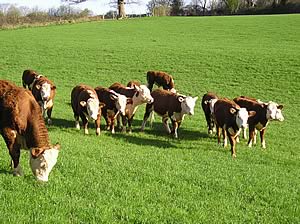2009-08-03
The Holme Lacy herd owned by the Herefordshire College of Technology and managed by Daniel Seaborne at the Holme Lacy Campus, has been recognised by EBLEX as the Most Improved Herd for the Hereford breed for 2008/09.
Hereford cattle on the Holme Lacy Estate
 |
The award is presented by the EBLEX Beef Better Returns Programme (Beef BRP), to the recorded herd that shows the greatest genetic gain for commercial traits over a 12-month period. There is a separate award for each of ten UK breeds.
Daniel Seaborne has been farm manager at the college for the past 14 years. Although the 224ha (548 acre) farm is a teaching resource, it is treated very much as a commercial enterprise.
There is woodland, including a deer park, cider orchards, 106ha (260 acres) of arable and vegetable crops, and 44ha (108 acres) of permanent pasture and leys for the 40 pedigree Hereford cows and 400 Lleyn ewes.
The farm went through organic conversion in the late 1990s. The Holme Lacy herd was established in 2001 with the purchase of a bull and 40 in-calf heifers from four local herds.
Calving takes place in the spring, with the majority calving outdoors – weather permitting. The cows are served by one stock bull and one young bull, while the maiden heifers are served by AI.
The calves stay with their mothers for the first summer and are given no creep feed. They are housed during late November when the male calves are castrated and finished as steers. This allows them to stay with the heifers and makes them quieter and easier for the students to handle.
The calves are weaned at nine to ten months old and fed silage plus 1kg/head/day of home-grown wheat and beans. They go out to grass for a second season from March. Steers are finished at around two years at a target live-weight of 650kg, and sold through a specialist organic meat company.
Heifers are served at 15 months of age over a six-week period. Around six are kept for replacements and eight sold as in-calf heifers. Any not in calf are slaughtered at around two years of age at a target live-weight of 550 - 600kg, and retailed through a box scheme.
Mr Seaborne’s background is in dairy farming, where selecting bulls and heifers by combining type and figures is commonplace. He believes strongly in the use of performance records in pedigree beef production. Tools such as Estimated Breeding Values (EBVs) are always used to help select the right sires for the Holme Lacy herd.
In particular, he is looking for good 600-day weights. All the beef cattle are sold deadweight so good EBVs for eye muscle depth are important. Figures for ease of calving are also taken into account.
“We always select bulls that are in the top 20% of their breed index,” explains
Mr Seaborne. “But we don’t just rely on the figures - they must also look good and come from a strong cow family.
“Our aim is to continue improving the herd by developing better conformation and producing milkier-type cows, whilst retaining the breed’s core attributes of being food foragers.”
When asked how he felt about winning the award, Mr Seaborne says: “I hadn’t realised we had improved as much as we have, but expect it is down to the performance of one high index bull we bought three years ago. We were impressed with his performance records and EBVs.
“We will know for sure when his first calves are sold and we see the weights and grades they make.”
EBLEX breeding specialist Samuel Boon agrees.
“EBVs are measurements of genetic potential and provide a reliable insight into the effect a bull could have on the herd,” he says. “It means producers can make informed purchasing decisions rather than leaving it to chance, and hoping the chosen bull will deliver on the commercially important traits.
“All the winners of the Improved Herd Awards record the performance of their herds. All are providing valuable information that can help customers produce animals that make them money, because they meet producer, processor, retailer and consumer demand, and do so as efficiently as possible.
“I congratulate the students and Daniel Seaborne on the excellent job they are doing with the Holme Lacy herd.”
 Sowenna Herd Wins EBLEX Award for British Simmental Breed Sowenna Herd Wins EBLEX Award for British Simmental Breed
 Pia Troon Herd Wins EBLEX Award for British Charolais Breed Pia Troon Herd Wins EBLEX Award for British Charolais Breed
 All Ireland Aberdeen Angus Championships at Clogher Valley Show All Ireland Aberdeen Angus Championships at Clogher Valley Show

|




